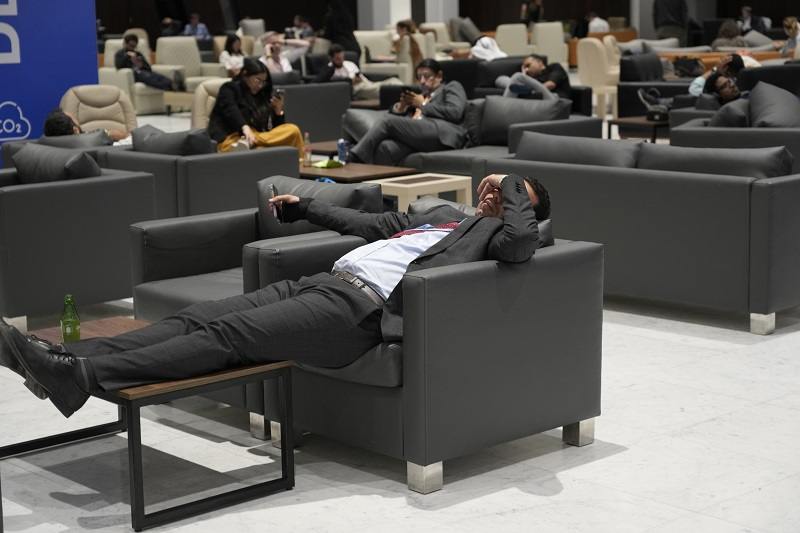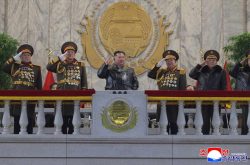
Attendees and members of the media lounge as they wait for a closing plenary session at the COP27 U.N. Climate Summit on Sunday in Sharm el-Sheikh, Egypt.
11:53 JST, November 20, 2022
SHARM EL-SHEIKH, Egypt (AP) — Delegates at the United Nations climate summit in Egypt officially approved a deal on a fund for developing countries vulnerable to climate change made worse by polluting developed nations at a plenary session early Sunday.
An agreement was reached between parties Saturday afternoon.
COP27 President Sameh Shoukry gaveled the decision a little after 4 a.m. on Sunday to a round of applause.
Loss and damage made it on the official agenda for the first time at the summit in Egypt after increasing pressure from developing countries.
Key decisions on phasing out all fossil fuels and keeping the 1.5 degrees Celsius warming limit agreed during last year’s climate summit in Glasgow in the text still hang in the balance.
***
KEY DEVELOPMENTS:
— Last minute objections threaten historic UN climate deal
— Despair, lack of progress at climate talks, yet hope blooms
***
Ireland’s environment minister said early Sunday that parties were still awaiting an overarching draft of the U.N. climate summit’s final document.
“I think everybody’s very unhappy that we’re here, one in the morning, we’re still waiting for the cover text,” said Eamon Ryan. “I think that’s very unusual, to say the least.”
After nations looked set to reach an agreement Saturday afternoon on a deal over funding for countries vulnerable to the effects of climate change, talks appeared to stall that evening and into Sunday on emissions cuts and phasing out fossil fuels.
Delegates and observers were seen sleeping in hallways outside the main plenary building.
Ryan said he wanted to see more “ambition” on emissions cuts that would build on pledges made last year to limit warming to 1.5 degrees Celsius (2.7 Fahrenheit) above pre-industrial times.
“We’re not satisfied that there’s been sufficient ambition on reducing emissions, and we’re going to have to see what further improvements we can get here, but also come back to it,” Ryan said.
***
France’s energy minister said some “confusion” remains over certain wording on an agreement reached by parties earlier Saturday on loss and damage funding for developing countries suffering from the impacts of climate change cause by high-emitting nations.
“There is a gap between what was understood by some countries, and what was understood by some other countries,” said Agnès Pannier-Runacher. “What is reflected in the agreement does not correspond to the common understanding of the document.”
On Saturday afternoon nations were poised for an agreement on a loss and damage fund. It is yet to be ratified.
Pannier-Runacher said countries had agreed to a fund “particularly dedicated to vulnerable countries” but that wasn’t reflected in the current text.
***
Norway’s climate and environment minister said people are “frustrated” by the lack of progress.
Espen Barth Eide said “there were some good spirits” earlier Saturday following a breakthrough on funding for vulnerable countries suffering from the impacts of climate change, known as loss and damage.
But progress stalled on mitigation, or a deal of slashing fossil fuels.
“Some of us are trying to say that we actually have to keep global warming under 1.5 degrees and that requires some action,” he said.
“But there’s a very strong fossil fuel lobby … who are trying to block any language that we produce.”
***
Papua New Guinea’s climate envoy said talks are “now in the hands of the presidency to listen and to propose something that will be acceptable by enough of the parties to move it forward.”
Speaking late Saturday, Kevin Conrad said that nations were looking for pledges for tougher cuts on emissions that would be in line with limiting warming to 1.5 degrees Celsius (2.7 degrees Fahrenheit).
“People want ambition when it comes to mitigation, and that’s valid,” he said.
Malcolm Stufkens, the Honduran vice minister of environment agreed that progress on pledges to cap temperature waring needed to be in a final document.
“I think that it’s time for us just to deliver and especially keep the 1.5 (Celsius goal),” Stufkens said.
***
European officials insisted Saturday that a deal at U.N. climate talks should include a commitment to keep the 1.5 degrees Celsius (2.7 degrees Fahrenheit) target of the 2015 Paris agreement alive.
“We need to get a deal on 1.5 degrees. We need strong wording on mitigation and that’s what we’re going to push,” said Ireland’s Minister for the Environment Eamon Ryan, who is also the European lead negotiator on loss and damage. Mitigation is climate-speak for cutting emissions.
German climate envoy Jennifer Morgan also called for keeping the “1.5 degree in sight,” to be able to “to keep the losses and the damages in check.”
Romina Pourmokhtari, Sweden’s climate minister added that “science says that we’re in a rush and that has to be represented in the negotiations that we have.”
***
A group of states known as the High Ambition Coalition, including the U.K. and Germany, has urged for an agreement to be reached on having a key warming goal part of the final document at COP27, the U.N. climate talks in Egypt.
“We come together to say that we must emerge from COP 27 with a package of outcomes that keeps 1.5 alive and protects the world’s vulnerable,” said Marshall Islands’ climate envoy Kristina Stege.
Stege said commitments made at the summit need to be “grounded” in science. Climate scientists have warned that if the earth warms more than 1.5 degrees Celsius (2.7 Fahrenheit) climate disasters would significantly worsen.
“This COP decision must put the world on a path to phasing out all fossil fuels and an urgent just transition to renewables,” she added.
***
More than a dozen young activists gathered at the United Nations climate conference Saturday to pressure negotiators to phase out fossil fuels and agree on a climate financing facility.
The activists, from the Fridays for Future movement, also criticized the delay in climate negotiations which dragged to Saturday after negotiators failed to achieve an agreement before the official end of the conference on Nov. 18.
The activists raised signs with slogans read: “Don’t fail us,” and “Deliver loss and damage,” referring to a fund for vulnerable countries who have done little to contribute to climate change from carbon polluting nations.
Negotiators said earlier Saturday they struck a potential breakthrough deal on the creation of a fund for ‘loss and damage.’
Activists were not convinced.
“The deal is not good,” said activist Helena Marschall.
Marschall accused the United States and the European Union of blocking a deal on loss and damage and urged them along other world leaders “to recognize that we have a lot of work to do.”
***
Negotiators at U.N. climate talks in Egypt say they have struck a potential breakthrough deal on the creation of a fund for compensating poor nations that are the most vulnerable to climate change, called ‘loss and damage.’
“There is an agreement on loss and damage,” Maldives Environment Minister Aminath Shauna told The Associated Press Saturday. “That means for countries like ours we will have the mosaic of solutions that we have been advocating for.”
It still needs to be approved unanimously in a vote later today.
Saturday afternoon’s draft proposal came from the Egyptian presidency.
***
Two separate drafts released by the Egyptian presidency, on efforts to step up emissions cuts and the overarching decision of this year’s talks, barely build on what was agreed in Glasgow last year.
The texts leave in place a reference to the Paris accords goal of limiting global warming to “well below 2 degrees Celsius (3.6 Fahrenheit)” which scientists say is far too risky.
They also don’t suggest any new short-term targets for either developing or developed countries, which experts say are needed to achieve the more ambitious 1.5 C (2.7 F) goal that would prevent some of the more extreme effects of climate change.
A new proposal on the issue of loss and damage that calls for the creation of a new fund to help developing countries hit by climate disasters said developed countries would be “urged” to contribute to the fund, which would also draw on other private and public sources of money such as international financial institutions.
However, the proposal does not suggest that major emerging economies such as China have to contribute to the fund, which was a key ask of the European Union and the United States.
It also does not tie the creation of the new fund to any increase in efforts to cut emissions, or restrict the recipients of funding to those countries that are most vulnerable.
***
Alok Sharma, the British official who chaired last year’s climate talks in Glasgow, declined to comment on criticism of the Egyptian presidency, but made clear that an ambitious outcome to combat climate change was crucial.
“Every presidency runs things in their own way,” he said. “The key issue for me and for the UK is that what we have here at the end of the day is a balanced and ambitious text across all the key pillars,” he said.
“For us it’s also vitally important to not just preserve what we agreed in Glasgow but that we build on that as well,” said Sharma, referring to the recommitment made last year to limiting warming to 1.5 degrees Celsius (2.7 Fahrenheit) and a pledge to increase efforts to slash emissions cuts.
***
Spain’s environment minister said they are willing to walk out if they can’t reach a fair deal at the U.N. climate talks.
“We could be exiting of course,” said Teresa Ribera. “We won’t be part of a result that we find unfair and not effective to address the problem that we are handling, which is climate change and the need to reduce emissions.”
Ribera said she is “concerned” that a draft of the final document may not include a mention of the 1.5 degrees Celsius (2.7 degrees Fahrenheit) warming limit target set in Paris in 2015.
She added she didn’t want to see a result “that may backtrack what we already did in Glasgow,” referring to the renewed commitment to the 1.5 C goal at the climate summit last year.
“That’s something that we’d like to see, that there is a strong commitment to the 1.5 target,” said Teresa Ribera.
On the role of the presidency, Ribera said that the process has been “very confusing.”
“It is not clear … and we are running out of time,” she said.
***
Egyptian Foreign Minister Sameh Shoukry said parties must now “rise to the occasion” in a news conference Saturday morning.
“The issue now rests with the will of the parties,” Shoukry said at a press conference. “It is the parties who must rise to the occasion and take upon themselves the responsibility of finding the areas of convergence and moving forward.”
On a new draft text for the overarching decision at the conference, which was being worked on overnight, Shoukry said that “a vast majority of the parties indicated to me that they considered the text as balanced and that they constitute a potential breakthrough that can lead to consensus.”
He added that “all must show the necessary flexibility” in reaching a consensus, and that Egypt was merely “facilitating this process.”
***
New Zealand’s climate minister has said a draft of the final document circulated by the presidency “has been received quite poorly by pretty much everybody,” adding that delegations are going into another round of talks.
Speaking to The Associated Press, James Shaw called the draft “entirely unsatisfactory.”
He added that the proposal “abandons really any hope of achieving 1.5 (degrees Celsius, 2.7 degrees Fahrenheit),” referring to the warming limit agreed at the Paris agreement back in 2015.
He said parties will continue to work on the issue as well as look to reach consensus on a loss and damage fund for developing nations who are suffering from the impacts of climate change.
“Everybody wants an outcome on loss and damage and everybody wants to keep 1.5 alive. So that’s what we’re going to keep doing,” he said.
***
German Foreign Minister Annalena Baerbock says that responsibility for the fat of the U.N. climate talks “now lies in the hands of the Egyptian COP presidency.”
She said the European Union had made clear overnight that “we will not sign a paper here that diverges significantly from the 1.5 C path, that would bury the goal of 1.5 degrees.”
“If these climate conferences set us back then we wouldn’t have needed to travel here in the first place,” she said.
Top Articles in News Services
-

Survey Shows False Election Info Perceived as True
-

Hong Kong Ex-Publisher Jimmy Lai’s Sentence Raises International Outcry as China Defends It
-

Japan’s Nikkei Stock Average Touches 58,000 as Yen, Jgbs Rally on Election Fallout (UPDATE 1)
-

Japan’s Nikkei Stock Average Falls as US-Iran Tensions Unsettle Investors (UPDATE 1)
-

Trump Names Former Federal Reserve Governor Warsh as the Next Fed Chair, Replacing Powell
JN ACCESS RANKING
-

Producer Behind Pop Group XG Arrested for Cocaine Possession
-

Japan PM Takaichi’s Cabinet Resigns en Masse
-

Man Infected with Measles Reportedly Dined at Restaurant in Tokyo Station
-

Israeli Ambassador to Japan Speaks about Japan’s Role in the Reconstruction of Gaza
-

Videos Plagiarized, Reposted with False Subtitles Claiming ‘Ryukyu Belongs to China’; Anti-China False Information Also Posted in Japan

























